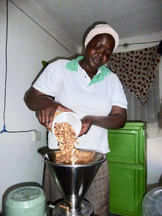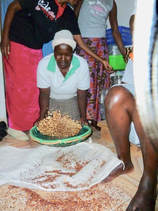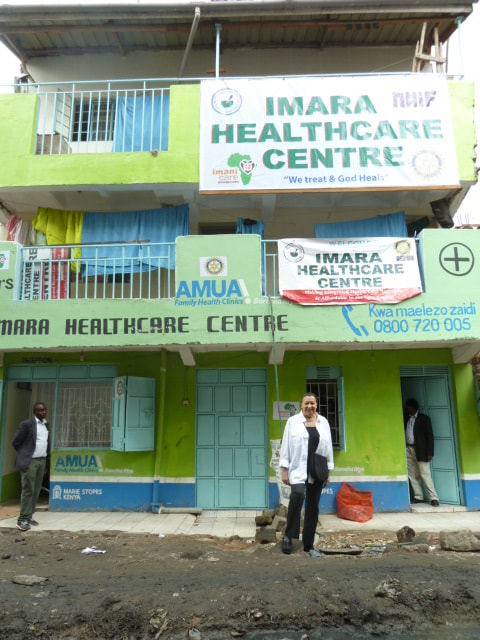
Visit to Imara Healthcare Centre
March 15-29 2018
by Eganville Rotarians Mona and Alan Fox
The objectives of our trip to Nairobi were as follows:
Pictured to right is Mona in front of a newly painted Imara Healthcare Centre
March 15-29 2018
by Eganville Rotarians Mona and Alan Fox
The objectives of our trip to Nairobi were as follows:
- to see changes at the Imara Healthcare Centre and try and find funding for the remaining equipment needed for their Operations Room
- to assess the work of the Shakinah peanut butter women and their progress in becoming a sustainable business
- to plan a new project at Siloam School in the Mukuru slum, which would address fundamental issues of gender equity related to menstruation management and sexual violence
- to maintain and extend our contacts with Nairobi Rotary clubs.
Pictured to right is Mona in front of a newly painted Imara Healthcare Centre
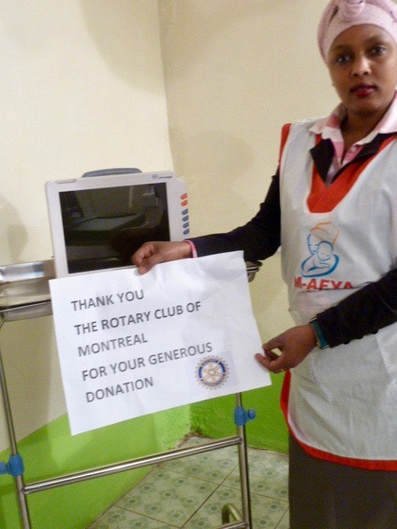
Imara Healthcare Centre
The big change since we were in Nairobi a year ago was the painting of the entire premises thanks to a donation by our Nairobi host, Barrack Odero. The new paint has succeeded in giving the Centre a cleaner, fresher look.
The Operations Room is now in use although there is still need to purchase a baby resuscitator and a baby incubator. We raised this issue with the members of the Rotary clubs we attended. We also learned of a possible source of funding for this equipment through a connection to the first lady of the Government of Makueni County, Nazi Kivutha. She chairs the Council of Governor’s Wives, which reports to the President’s wife, Margaret Kenyatta who has raised funds to promote maternal healthcare and reproductive care. A letter has been sent to Mrs Kenyatta requesting support.
Pictured to the left is the newly purchased patient monitor for the Post- Op room. Funding for the purchase came from The Rotary Club of Montreal, Fondation Coup de Couer and Fondation Louise Grenier
The big change since we were in Nairobi a year ago was the painting of the entire premises thanks to a donation by our Nairobi host, Barrack Odero. The new paint has succeeded in giving the Centre a cleaner, fresher look.
The Operations Room is now in use although there is still need to purchase a baby resuscitator and a baby incubator. We raised this issue with the members of the Rotary clubs we attended. We also learned of a possible source of funding for this equipment through a connection to the first lady of the Government of Makueni County, Nazi Kivutha. She chairs the Council of Governor’s Wives, which reports to the President’s wife, Margaret Kenyatta who has raised funds to promote maternal healthcare and reproductive care. A letter has been sent to Mrs Kenyatta requesting support.
Pictured to the left is the newly purchased patient monitor for the Post- Op room. Funding for the purchase came from The Rotary Club of Montreal, Fondation Coup de Couer and Fondation Louise Grenier
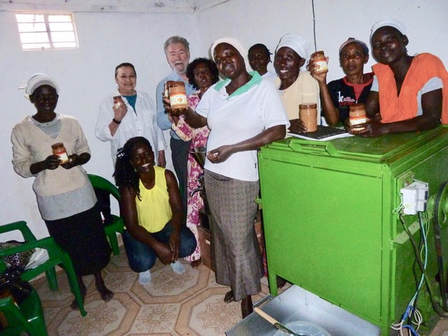
The Shakinah Peanut Butter Women
Last July the Women’s Inter Church Council of Canada (WICC) provided a grant to a group of HIV+ women to form a cooperative business selling peanut butter in the Mukuru slum. Unfortunately they had a slow start getting established because of problems with the equipment they purchased and the unrest resulting from the national elections last summer.
Also, the concept of running a business was new to them and sales were far less than anticipated. However, our hostess in Nairobi, Isabella Olwenyo, a business woman herself, has agreed to work with the group to help them become sustainable
Last July the Women’s Inter Church Council of Canada (WICC) provided a grant to a group of HIV+ women to form a cooperative business selling peanut butter in the Mukuru slum. Unfortunately they had a slow start getting established because of problems with the equipment they purchased and the unrest resulting from the national elections last summer.
Also, the concept of running a business was new to them and sales were far less than anticipated. However, our hostess in Nairobi, Isabella Olwenyo, a business woman herself, has agreed to work with the group to help them become sustainable
|
Below, raw peanuts are being processed in preparation for the production and bottling and labeling of the final product, peanut butter.
|
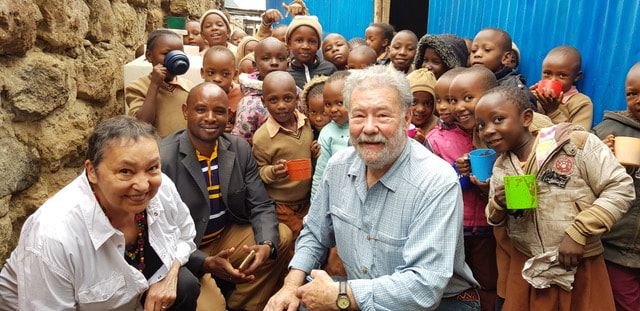 Mona, Headmaster Joel Nzuki and Alan with curious children
Mona, Headmaster Joel Nzuki and Alan with curious children
Siloam School
The main focus of our work in Nairobi was related to fundamental issues of gender equity surrounding menstruation management and violence against women.
Menstruation management is a major issue because girls in the slum are too poor to buy menstrual pads. So they
either trade sex for pads, with the attendant risks of HIV and pregnancy, or they stay home from school. In many cases they drop out of school altogether. This means that girls are at a disadvantage when looking for employment and are unable to find rewarding jobs.
To address this issue we plan a series of workshops to make girls aware of the biology of puberty and provide a forum where they are free to ask questions about this taboo subject. We also plan providing the Imara Community Health Workers with an opportunity to work making sanitary pads and these will be distributed to girls at the school. We will also build new toilets and a dedicated area for girls where they can change their sanitary pads. We held discussions with an environmental engineer about constructing bio-degradeable toilets. Our host, Barrack, is trying to find financial support in Kenya for making and distributing sanitary pads. He is also looking for support for a feeding program, the purchase of school uniforms, blackboards and transparent roofing.
The other equity issue is sexual violence, which is common both in the home and on the streets in the Mukuru slum. To address this issue, we plan partnering with Ujamaa Kenya, which has a very effective program to prevent sexual interference and rape. Their program also addresses the need for boys to respect girls and to intervene if they witness sexual intimidation or violence.
Ujamaa also provide counselling for menstruation management and we will be looking into working with them to see how we can collaborate.
The main focus of our work in Nairobi was related to fundamental issues of gender equity surrounding menstruation management and violence against women.
Menstruation management is a major issue because girls in the slum are too poor to buy menstrual pads. So they
either trade sex for pads, with the attendant risks of HIV and pregnancy, or they stay home from school. In many cases they drop out of school altogether. This means that girls are at a disadvantage when looking for employment and are unable to find rewarding jobs.
To address this issue we plan a series of workshops to make girls aware of the biology of puberty and provide a forum where they are free to ask questions about this taboo subject. We also plan providing the Imara Community Health Workers with an opportunity to work making sanitary pads and these will be distributed to girls at the school. We will also build new toilets and a dedicated area for girls where they can change their sanitary pads. We held discussions with an environmental engineer about constructing bio-degradeable toilets. Our host, Barrack, is trying to find financial support in Kenya for making and distributing sanitary pads. He is also looking for support for a feeding program, the purchase of school uniforms, blackboards and transparent roofing.
The other equity issue is sexual violence, which is common both in the home and on the streets in the Mukuru slum. To address this issue, we plan partnering with Ujamaa Kenya, which has a very effective program to prevent sexual interference and rape. Their program also addresses the need for boys to respect girls and to intervene if they witness sexual intimidation or violence.
Ujamaa also provide counselling for menstruation management and we will be looking into working with them to see how we can collaborate.
Rotary Networking
We attended meetings of the Rotary clubs of Milimani and Syokimau as well as the new Rotary club of Kitengela ,which was chartered on April 7th and the RC of Sowerby Bridge in Yorkshire, UK. We also attended a free Medical Camp, which was sponsored by RC Milimani. It is our hope that these clubs will contribute to the project we hope to launch later in the year.
Next Steps
We expect to apply for a Global Grant to support activities at Siloam School related to menstruation management and sexual violence. We will be exploring sources of funding from both Rotary clubs and individuals in Kenya, We will also be looking for support from District 7040 clubs.
We attended meetings of the Rotary clubs of Milimani and Syokimau as well as the new Rotary club of Kitengela ,which was chartered on April 7th and the RC of Sowerby Bridge in Yorkshire, UK. We also attended a free Medical Camp, which was sponsored by RC Milimani. It is our hope that these clubs will contribute to the project we hope to launch later in the year.
Next Steps
We expect to apply for a Global Grant to support activities at Siloam School related to menstruation management and sexual violence. We will be exploring sources of funding from both Rotary clubs and individuals in Kenya, We will also be looking for support from District 7040 clubs.
